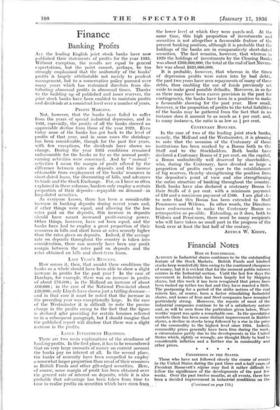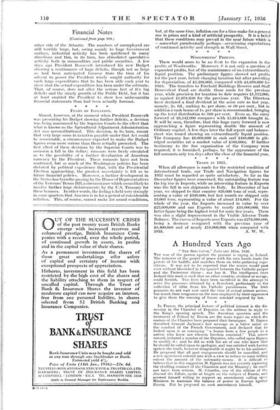Financial Notes
RISE IN INDUSTRIALS.
AcrivrrY in Industrial shares continues to be the outstanding feature of the Stock Markets. British Funds and kindred stocks keep wonderfully firm owing to the continued cheapness of money, but it is evilent that for the moment public interest centres in tge Industrial section. Until the last few days the movement in Industrials has been largely led by Shipping shares, but this week it has been recognised that prices have been rushed up rather too fast and they have reacted a little. The postponing for a period of the strike notices of the coal miners has, of course, been a factor stimulating Industrial shares, and issues of Iron and Steel companies have remained particularly strong. Moreover, the reports of most of the industrial companies continue to be of a satisfactory nature and; as will be seen from the particulars given below, Wool- worths' report was quite a remarkable one. In the speculative markets there has been some distinct improvement in Rubber shares, a decline in stocks being followed by a rise in the price of the commodity to the highest level since 1934. Indeed, commodity prices generally have been firm during the week, a circumstance partly due to the developments in the United States which, rightly or wrongly, are thought likely to lead to considerable inflation and a further rise in commodity and
other prices. -
* * * *
CONDITIONS IN THE STATES.
Those who have not followed closely the course of events in the United States during the past three and a-half years of President Roosevelt's regime may find it rather difficult to follow the significance of the developments of the past few weeks. Over the past twelve months, at all events, there has been a decided improvement in industrial ponditiona on the (Continued on page 110.)
Financial Notes
(Continued from page 108.) other side of the Atlantic. The numbers of unemployed are still terribly large, but, owing mainly to huge Government outlays, industrial activity has been quickened in many directions and this, in its turn, has stimulated speculative activity both in commodities and public securities. A few days ago President Roosevelt introduced his new Budget showing a continuance of .huge deficits, though not so large as had been anticipated because from the time of his advent to power the President wisely sought authority for such large expenditures that he has been able each year to show that the actual expenditure has been under the estimate. That, of course, does not alter the serious fact of tie big deficits and the steady growth of the Public Debt, but it has at least enabled the President to show less unfavourable financial statements than had been actually forecast.
FEARS OF INFLATION.
Almost, however, at the moment when President Roosevelt was 'presenting his Budget showing further deficits, a decision was being announced by the Supreme Courts to the effect that what is known as the Agricultural Adjustment Administration Act was unconstitutional. This decision, in its turn, meant that very large sums in taxation payable under that Act could be recoverable, a circumstance expected to make the Budget figures even more serious than those actually presented. The first effect of these decisions by the Supreme Courts was to occasion a fall in the dollar ; rumours were freely circulated as to the possibility of a further devaluation of American currency by the President. These rumours have not been confirmed, but so much of the Washington policies has been dictated by political expediency that, with the Presidential Election approaching, the greatest uncertainty is felt as to future financial policies. Moreover, a further development in the States has been thc passing by the house of Representatives of the Veterans' Bonus Bill, a circumstance which seems likely to involve further huge disbursements by the U.S. Treasury for these bonuses. In other words, the feeling is held very strongly in some quarters that America is in for a period of considerable inflation. This, of course, cannot snake for sound conditions, but, at the same time, inflation can for a time make for a general rise in prices and a kind of artificial prosperity. It is a belief that these conditions may prevail in the near future which is —somewhat paradoxically perhaps—occasioning expectations of continued activity and strength in Wall Street.
* * • * WOOLWORTHS' PROFITS.
There would seem -to be no to the expansion in the profits of Woolworths. Moreover, it is not only a question of expanded profits, but of the maintenance of an extraordinarily liquid position. The preliminary figures showed net profits for the past year, before charging taxation but after providing for depreciation, of £5,298,000, compared with £4,880,000 for 1934. The transfers to Freehold Buildings Reserve and Staff Benevolent Fund are double those made for the previous year, while provision for taxation to date requires £1,112,000, as against £1,078,000 for the previous year. The Directors have declared a final dividend at the same rate as last year, namely, 2s. 6d., making 4s. per share, or 80 per cent., but in addition a cash bonus of ls. per share is recommended, bringing up the total distribution to 100 per cent. Even so, the carry forward of £6,542,000 compares with £5,614,000 brought in. It will be seen, therefore, that this huge carry forward is now approaching a figure representing double the amount of Ordinary capital. A few days later the full report and balance- sheet was issued showing an extraordinarily liquid position. The Company has £6,608,000 in cash and £488,000 in gilt- edged securities (at a market value of £503,000). If further testimony to the fine organisation of the Company were required, it is furnished, perhaps, by the appearance of the full accounts only ten days after the close of the financial year.
* * * _
TRADE TN 1935.
When all allowance is made for the restricted condition of international trade, our Trade and Navigatioa figures for 1935 must be regarded as quite satisfactory. So far as the December figures were concerned, the outstanding feature was the big rise in Imports, while an interesting feature in Exports was the fall in our shipments to Italy. In December of last year, we shipped to that country 420,000 tons of coal, repre- senting a value of 2349,000, but last month we shipped only 19,000 tons, representing a value of about 214,000. For the whole of the year, the Imports increased in value by over £25,000,000 and our Exports by nearly £34,000,000, this latter figure being the highest total for some five years. There was also a slight improvement in the Visible Adverse Trade Balance. The excess of Imports over Exports was £276,000,000, being a decrease compared with the previous year of £8,400,000 and of nearly £18,000,000 when compared with







































 Previous page
Previous page